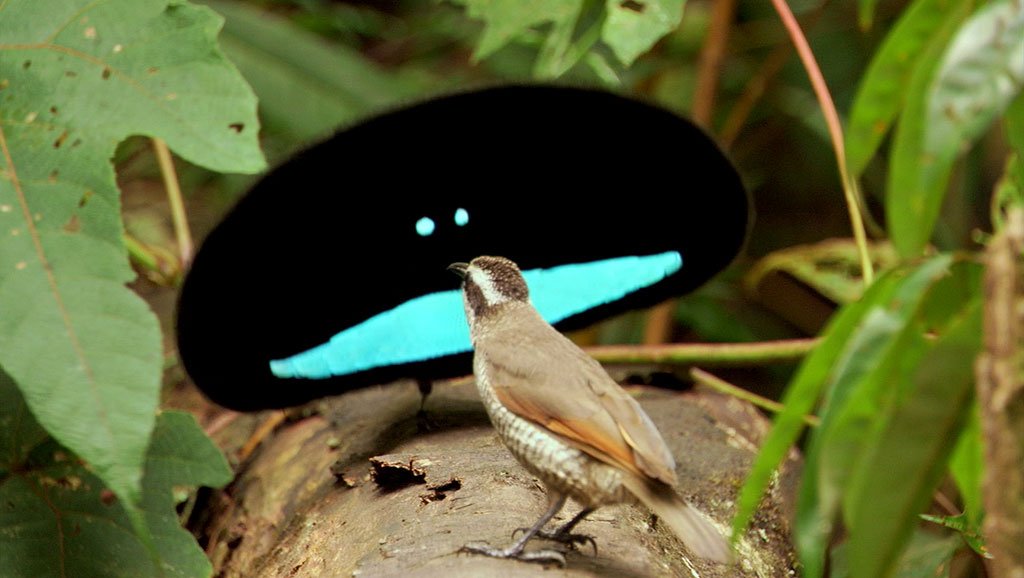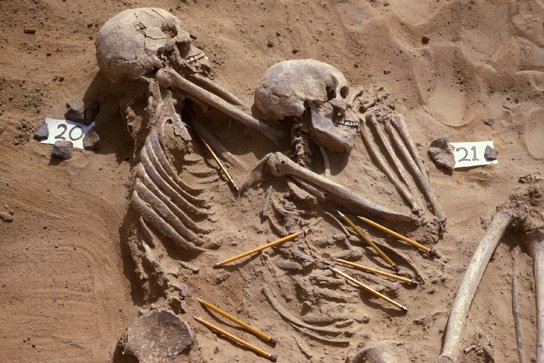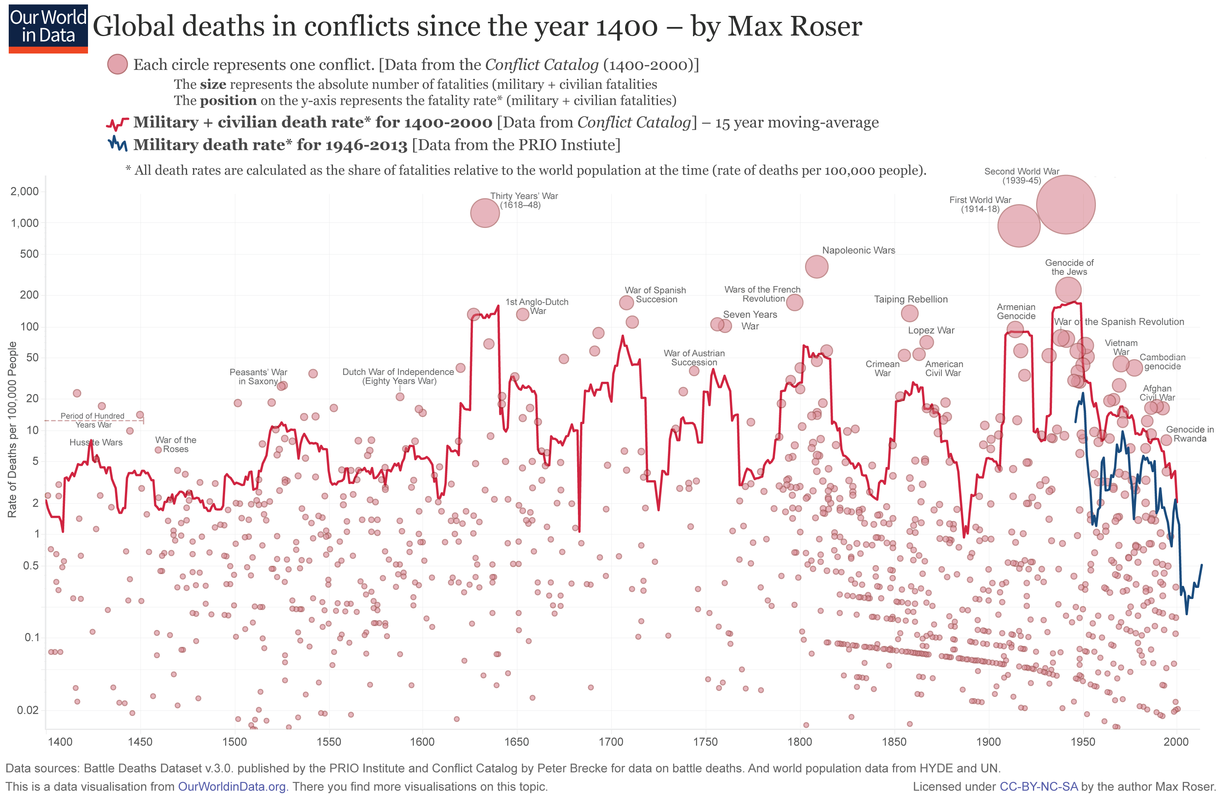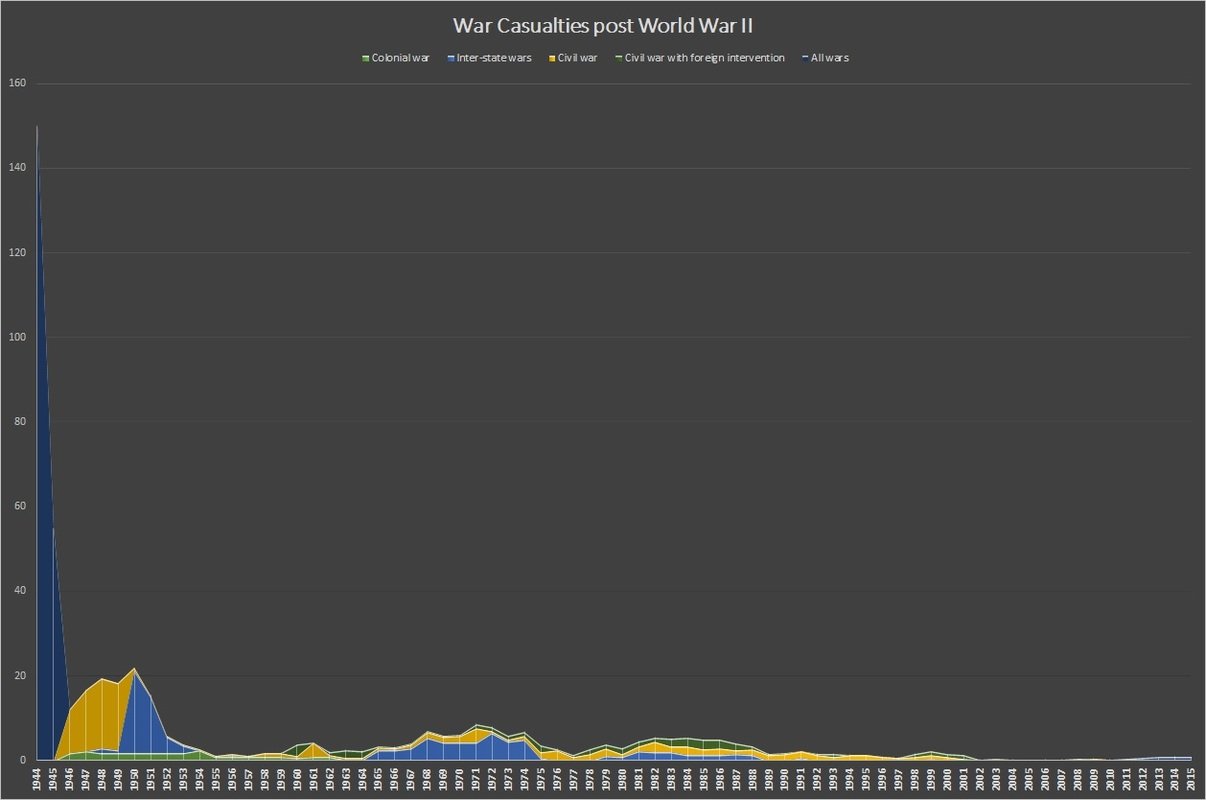Or how a perennially compulsive human obsession has become so passé
This will be a hopefully provocative and specific rumination on the topic. Would love some debate in the comments!
Violent conflict has been a key mechanism in the process of evolution by natural selection. Right from the simplest of organisms to the grand battles of wildebeests, violence between individuals often decides who survives and who dies without an offspring. Ultimately, this shapes the evolution of the species and the ecosystem in general.
Interspecies violence is usually limited to either hunting or territory. Sure, some species are cannibalistic, but intraspecies violence is largely about mating and territory. Some species - such as birds of paradise - have pretty graceful competitions to decide which male gets the mate. But for a majority of species it is indeed victors of violent conflict that pass on there genes.

A gentler alternative to War. Source.
More "intelligent" species - mostly mammals - form societies where individuals work together. Many of these societies are triggered by violence, with a dominant male being selected. Going further up the "intelligence" ladder - mostly primates - peaceful societies are formed, where both males and females hunt and defend their territory together. Of course, even with primates, there are competing societies fighting for the same territory, and this is the prelude to human warfare.
For humans, war is much more than just a conflict to gain territory, hunt for food, gather resources and secure a safe future for offspring. Homo sapiens have been stuck in a pretty exotic place on the evolutionary ladder. We are just about smart enough to create our tools, be aware of our existence, but not smart enough to reject our base impulses and instincts.
At the very core, humans have pretty much the same instincts as our mammalian - or indeed, reptilian - cousins. Our common primary goal is to compete for the best mate. Where things get muddled is how we interpret these impulses. Enter, the ego.
We don't just fight wars to secure enough territory for survival - we want more of it. We want to be the best. We want to defeat everyone else, conquer the entire world, and be the last man (clan) standing. That is what it means to be human.
And so, it begins - human warfare.
It doesn't just begin, it advances. Thanks to the process of evolution by natural selection, violent behaviour develops over the ages - of course, only the most violent victors get to pass on their genes, while pacifists die alone. As humans develop more advanced tools, so more deadly become the violence.
Site 117 and prehistoric warfare
It's safe to speculate that intergroup violence has been around since the beginning of homo sapiens a couple of hundred thousand years ago. Indeed, it was probably around since the beginning of the Stone Age 3 million years ago. The tools used for hunting would be just as effective for warfare - something homo erectus individuals must have perfected.

Source: British Museum
Site 117 represents the earliest known battle scene. Over 60 skeletons were dated back over 13,000 years - with men, women and children involved.
But this post is not about the history of war. It's about the sudden decline of it.
The Mongols
Humankind has seen it's fair share of violence, but The Mongols will always remain the crowning achievement. For a century, they destroyed much of Asia and Europe, resulting in an astonishing 40-60 million deaths. That's nearly 15% of the world's population at the time. Heck, they managed to conquer Moscow - which the likes of Charles XII, Napoleon and Hitler failed so miserably at!

First seen on Crash Course
Imagine the entire population of the North America and Western Europe being annihilated entirely - that's about the scale of destruction Genghis Khan's descendants exercised.
Not to mention, an immediate consequence of the Mongol conquests was the Black Death, which killed off up to half of Europe's entire population. The Mongols left the world in ruin, and it'd take a Fallout-style nuclear apocalypse to outgun the Mongols.
Post-Mongols to World War II
After a brief couple of centuries' peace while the world recovered from Mongolocalypse, the Thirty Years' War erupted in Europe in the 17th century. Since then, for the rest of the millennium, war and peace became a part of human existence. Each century, there would be at least one major war, interspersed with periods of peace and minor conflicts. Despite advancements in technology, wars never reached the heights of the Mongols - diplomacy was advancing at the same pace.

Source: OurWorldinData.org (visit for further sources)
For all its treasures, the industrial revolution played a large part in 'democratising' warfare. After the Napoleonic Wars, the 19th century was a time of relative peace. However, many smaller conflicts took places, including several independence movements.
Even so , the general trend is clear, the rate of deaths fell exponentially through the 19th century.
Something changed in the first half of the 20th century. Technology started advancing at a breakneck pace, and human intelligence failed to keep up. A century of Pax Britanica ended in deadly fashion, with World War I. That Great War ended with a temporary resolution at best. A World War II had to happen, sooner rather than later.
The Death of War - 2nd half 20th Century
World War II ended with a terrible invention - the nuclear bomb. It was a devastating conflict, one that scarred people's minds in an irreparable manner. Human compassion and diplomacy took a giant leap forward at the end of World War II.

Source: Our world is getting better all the time (visit for further sources)
War casualties fell off spectacularly right after World War II to levels never seen before. Around the mid 50s, things settled to a level of peace humankind had never imagined a few years prior.
Make no mistake, our innate aggression had to take hold anyway, but we diverted it to a Cold War instead of another Total World War. As a result, despite some conflict, the death tolls fell considerably.
Despite the Iraq War and War on Terror, the last decade was astonishingly peaceful. Sure, there's a slight uptick this decade with the East African and Levant conflicts, but it's still well below anything before 2000, and on its way down again.
The Future of War
The threat of World War III will always be present in our minds, as would the horrors of World War II. Hopefully that is what will keep us in check, as we continue to advance and evolve as a species, both genetically and memetically.
Today war is coming online and battles are fought in a virtual space. Looking to the future, we have one major challenge to overcome - The Singularity. Who knows how that will play out? The best we can do is to calm down on the human supremacy and embrace artificial intelligence. Valuing human effort over artificial intelligence is fundamentally no different from slavery. Today, this may seem absurd to some, just as abolishing slavery did not so long ago. We must learn from history and avoid those brutal mistakes.
Beyond the Singularity comes space colonisation and subsequent speciation, but that's a whole different can of worms...
Sources and References
The Better Angels of our Nature
Our world is getting better all the time
The evolution of lethal intergroup violence
British Museum
Atrocities: The 100 Deadliest Episodes in Human History
OurWorldinData
A Pest in the Land
PRIO
The Selfish Gene by Richard Dawkins
